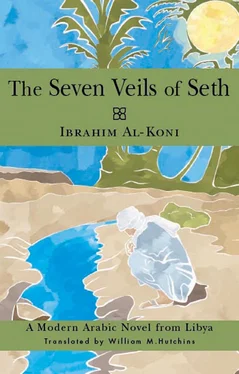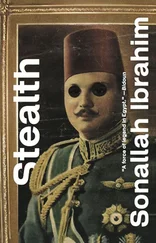The next morning she placed before him their son, wrapped in swaddling clothes, eyes protruding, blue-cheeked, his delicate neck still showing the imprint of her fingers. In an unfamiliar voice, she said, “I guessed that the nomad who did not choose to beget a child would never think of burying it in the ground.”
He deserted her.
He left her in the wilderness and bolted, roaming through the wastelands. Whenever he remembered what she had done, he collapsed and vomited till he almost threw up his guts, which had gone without food for days. His need for food led him to consume grass and drink from mud puddles. Although he had resolved he would never return to her, a disruptive whispering crept into his breast, urging him to go back. It was an odd kind of whisper; not one he could label. Only after he had groveled in his desert for several more days was he able to assign to it that strangest of all titles: compassion, alias mercy or the duty that binds the heart of anyone who has one. So he went back.
He returned to find her kneeling like some evil spirit at the tent’s entrance. She stared at him with the antipathy of a sorceress and the eye of a she-owl but said nothing. He sensed that it had been a mistake to return but realized as well that duty’s call inevitably leads to pain, even though it relieves the heart. Since her presence near him felt like a life-threatening lasso around his neck, he decided to liberate himself.
One day he approached her and began: “Do you remember any family member to whom I can take you?”
She replied gruffly, “I have no family. You know that.”
“There’s not some distant relation somewhere?”
When she shook her head no, he felt the lasso tightening but did not despair. “Tell me what I should do with you.”
“Just do what any man who takes responsibility for a woman does: he settles down with her on the land.”
“A nomad has no fixed abode. . as you know.”
“But I’m not a nomad. I’m a woman. I’m a female. I’m a mother. I can’t live if I don’t settle down. I want to have a fixed abode. I should have a home: is this true or false?”
He gazed curiously at her face. “How can you claim to be a mother when not long ago you strangled an infant you plucked from your own belly?”
“I strangled him because I know I can bring him back.”
“Bring him back?”
“Yes; I shall bring him back, since it is the earth that has swallowed his remains.”
“I see you’re speaking with the certainty of a priestess.”
“I am woman. I am the feminine. I am the mother. I am the earth. I am the goddess Tanit, whose soul was born from her soul and who created the entire desert from her flesh.”
“Amazing!”
“Your tragedy is that you’ve never known me.”
“I really don’t know you.”
“I am your destiny.”
“My destiny?”
“Woman is man’s destiny. Have you forgotten the Law’s teachings that stipulate her protection when hastening along narrow desert paths?”
“I’ve never heard a maxim like this attributed to the Law.”
“Who can claim to know all the teachings of the Law?”
She gazed off across the vacant land, which was flooded by dusk’s jagged shadows. She looked exactly like a true priestess reciting a novel prophecy when she declared: “Like the desert, the Law has no beginning and no end.”
Then she adopted a new approach. She began to repeat a new refrain, morning and evening: “You abducted me one day and then abandoned me. Why did you abduct me if you intended to abandon me?”
Eventually, growing sick of her ballad, he flung his rebuttal at her melancholy face: “I did not abduct you. I have not abandoned you. What it amounts to is that I don’t want to forsake my principles and renounce the nomadic life.” She was so overwhelmed by lethal sorrow that he forgot what she had done and rocked her on his lap. He decided to terminate both her pains and his own by terminating the farce tribes refer to as “marriage.” He went to the animal pen and milked a camel. The fresh milk was topped by thick froth. From his pack he withdrew a mysterious, herbal powder. Then he dropped a handful of the powder into the milk container, which he took to her. She was complaining of a headache, nausea, and pain in her joints. He squatted near her and watched as she sipped the spiked drink. She swallowed a little only to stop and glance furtively at him. Then she continued drinking from the container as the froth coated her pale lips. When she finished, she set the container aside.
She said, “Don’t start to imagine that I’m feeling sick because I’m pregnant. You know why I’m sick!” She leaned her head against his butt.
He murmured, “I know.” His response, however, did not assuage her rancor, and so he decided to ask her, “Why does a woman feel she needs to bear children?”
She replied in a voice that was not her own: “Because woman is a mother, because woman is the earth, because woman is a goddess. Haven’t I ever told you that?”
“Why should a woman destroy her children, since she is their mother?”
“Because a woman loves her children.”
“Does a woman kill her children out of love?”
“Yes, of course. The lover must kill the one he loves.”
“Why should a woman give birth if she is destined to kill?”
“Because the sun also shines; it shines only to set. Everything that comes into existence does so not in order to remain but to disappear.”
“Why should a thing appear if it is destined to disappear?”
“A thing must inevitably disappear. If it didn’t, it could not reappear.”
Her voice shook. She began to fade away but without any sign of suffering or any complaint. Her voice became muffled. She had trouble speaking. He toyed with locks of her hair and stroked her face. He asked, “Is it better for us to disappear or to reappear?”
“Appearing constitutes a loss, but when we disappear we regain what we had lost in the spirit world.”
“I’m happy to hear that, since you will recover there everything you have lost here.”
She did not respond. He felt her pulse and found the protruding vein limp. Then there was no pulse. He bent over her to examine the expression in her eyes by the light of the fire. He saw a profound surrender in her look. He closed her eyelids and muttered as if addressing the eternal stillness in the eternal wasteland: “Farewell, poetess of the nations! Farewell, priestess of the tribes! Farewell, goddess who gave birth to herself and created the desert from her flesh!”
PART II Section 1: The Right Course
He adopted the jenny as his mount after a disastrous experience with the malice of camels. In fact, it was the spiteful behavior of this species that drove him to the she-ass. To quench the thirst of some camels in Tassili, he had been busy drawing water from a well, aided by a camel, which he had received from a foreigner in repayment for a loan, without ever imagining that any of the tales of this species’ perfidy might come true. Just past noon, when the heat was most intense and when going back and forth around the mouth of the well had exhausted him and apparently that creature too, he was caught off guard by the behemoth’s rebellion. When it first veered off course to the right, he assumed it had become disoriented, but once he tried to catch it to guide it back to the path, the camel lengthened its stride and quickened its pace. Then the leather bucket, which was fastened to the well’s winch, tore apart, and the camel dragged the rope away behind it. He shot off in pursuit but did not catch it until it had descended into a nearby ravine, where it was halted when its halter rope became entangled in an acacia. He found it frothing and spitting angrily and voluminously as it tried to escape from the trap that the shrubby acacia had devised. He grabbed hold of the nose rope and attempted to calm the beast, but that was not meant to be, for there stirred within it a jinn troupe that — according to the tribes’ tales — had concluded an age-old pact with this creature’s ancestors. Although he detected a look of overt hostility in its hideous, bulging eyeballs, he freed the nose rope from the tree’s root and stroked the camel’s flank, caressing it the way mothers caress their babies, for he knew that camels delight in all types of fondling. Then he sang a lament, since he was sure that these creatures dote on songs of longing, but insanity — once awakened — is a demon that does not recognize affection. Frenzy too — once it emerges — is a ghoul that is not seduced by songs of longing. From deep in its chest it released an abominable sound. Then it twisted its neck back in a lightening-swift movement to bite his hand with its vicious teeth, which were filthy with foam and spit. Had he not fallen back at the last second, it would have seized his hand. Instead its teeth raked the back of his left hand, wounding it.
Читать дальше












